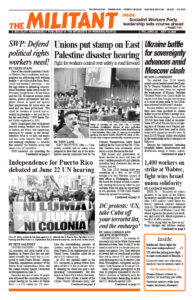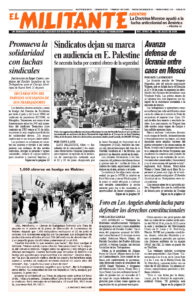The aborted June 23-24 heavily armed convoy headed toward the Kremlin by Yevgeny Prigozhin, head of the Wagner mercenary army, has exposed the weaknesses of Russian President Vladimir Putin’s rule. Cracks inside his regime have been brought into the open as a result of gains made by the Ukrainian resistance to Moscow’s invasion.
Russian workers and farmers in uniform have been sacrificed as cannon fodder in pursuit of Putin’s attempt to rebuild the Russian empire. An estimated 225,000 have been killed or wounded. Some 10% of all Russian forces occupying parts of Ukraine were Wagner mercenaries who have been used as shock troops with staggering casualty rates. At least 20,000 Wagner soldiers were killed in the monthslong battle to take parts of Bakhmut.
Moscow has confronted “mounting battlefield defeats; demoralization and disaffection among its troops; opposition from wide layers of working people and the middle classes at home; and antagonism, overt and covert, among bourgeois rivals atop Russia’s largest enterprises (who are cut off from profitable trade and financial markets) and within the state apparatus itself,” explain Jack Barnes, Mary-Alice Waters and Steve Clark in the book The Low Point of Labor Resistance Is Behind Us: The Socialist Workers Party Looks Forward.
In contrast to Putin’s increasingly disillusioned conscript army, Ukrainian forces are reinforced by thousands of volunteers, largely from the working class, determined to defend Ukraine’s independence.
Before the military incursion, Prigozhin declared that Moscow’s rationale for its invasion was false, saying Ukraine was never a threat to Russia. His comments reflect what millions of Russians know to be true and will deepen the challenges Putin faces trying to bolster support for the war.
“I changed my views after what happened with Wagner; I want this war to be over as soon as possible,” a Moscow pensioner told the Washington Post. “Prigozhin is right: Ukraine was not going to start the war against Russia.”
Putin said Prigozhin’s actions threatened civil war and the existence of Russia. He accused his former ally of treason and rejected his demands that Defense Minister Sergei Shoigu and Russia’s top general, Valery Gerasimov, be removed.
Prigozhin had claimed 30 of his fighters were killed in a June 23 air attack on their base by Moscow’s forces. That night, Wagner militias moved into Rostov-on-Don, Russia’s 10th largest city. Without firing a shot, they occupied the city-command center for Moscow’s military operations in Ukraine.
Prigozhin dispatched a column of 4,500 troops toward the capital. Some civilians greeted them with Russian flags and some Russian troops, mainly conscripts, surrendered. Putin was nowhere to be seen.
As the mercenaries came under air attack, they shot down six Russian helicopters and an airborne command plane. At least 15 airmen died.
Wagner forces got to within 125 miles of the capital. Putin called on Belarusian President Alexander Lukashenko to broker a deal. Faced with threats and promises, Prigozhin agreed to pull back in return for exile in Belarus and the offer that his fighters would get amnesty.
“When Prigozhin was heading towards Moscow, of course, it was nerve-racking for people,” a young woman from St. Petersburg told the Financial Times. “But to be honest, this horror has been continuing for one-and-a-half years already.”
Prigozhin is a wealthy businessman with long links to the Putin regime. Founded in 2014, his mercenary outfit was first used to provide military support to pro-Moscow separatists who seized parts of eastern Ukraine. Wagner has since helped Russia’s capitalist rulers advance their interests in bloody conflicts in Africa and the Middle East.
Following Moscow’s capture of Bakhmut, Prigozhin stepped up denunciations of top officials in the Russian Ministry of Defense over their factional withholding of ammunition and support to his forces. For weeks he has demanded the Russian government intensify its war and institute wide-scale conscription, forced labor and martial law.
War against Ukraine continues
Despite the turmoil in Russia, Moscow’s forces June 24 launched their largest series of missile strikes against Ukraine in recent months, targeting residential areas in Kyiv, Dnipro and Kryvyi Rih in Dnipropetrovsk that night. Most were shot down by Ukrainian air defenses.
The same day, Ukrainian forces’ counteroffensive advanced north and southwest of Bakhmut and in heavy fighting along the Zaporizhia front. Ukrainian forces have recaptured some of the land occupied by Moscow since 2014 in the eastern Donbas region.
In a June 24 address, Putin blamed Prigozhin for pushing Moscow toward defeat in Ukraine. “A blow like this was dealt to Russia in 1917, when the country was fighting in World War I. But the victory was stolen from it.”
“Intrigues, squabbles and politicking behind the backs of the army,” Putin claimed, led to “the destruction of the army and the collapse of the state, and the loss of vast territories.”
But what happened in 1917 was not the product of “intrigues.” Millions of workers, peasants and oppressed peoples made the world’s first socialist revolution. The czarist state did not collapse — it was overthrown. The Bolsheviks led the toilers and soldiers — sick of being used as cannon fodder for the capitalist rulers in the first imperialist world war — to take power into their own hands, establish a workers and farmers government and end Russian involvement in the war.
Led by V.I. Lenin, the new government uprooted the czarist prison house of nations by granting oppressed nations, like Ukraine, the right to self-determination, establishing a voluntary federation of Soviet Socialist Republics and roused working people to turn back the efforts of the czarist forces and imperialist invaders to overthrow the revolution.
Nothing close to that is about to happen in Russia today. Forging a communist leadership is still far ahead for working people.

